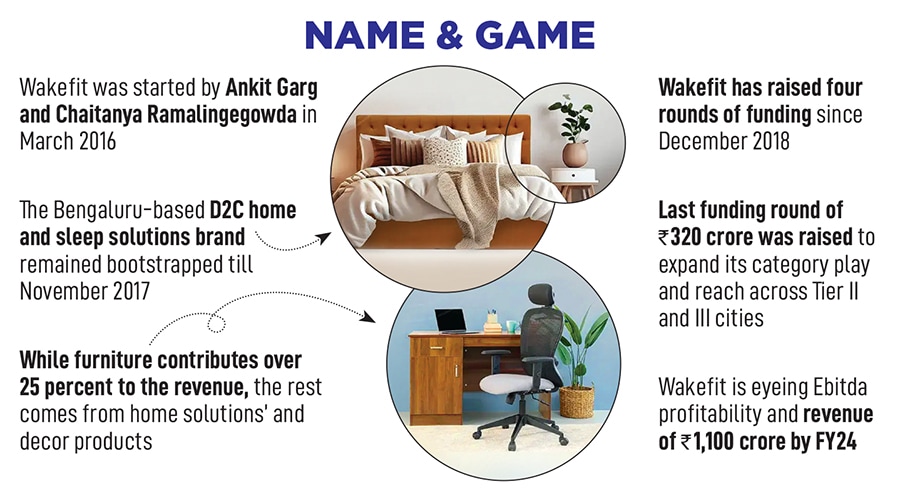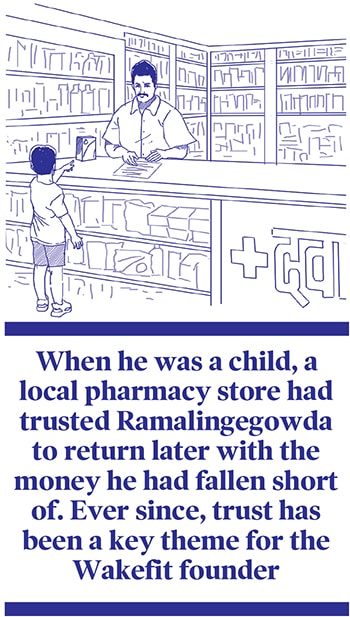The owner of the pharmacy was keenly watching his actions. “Paisey kam hain [Falling short of money]?" he asked. The boy nodded gingerly. “Koi baat nahin. Agli baar de dena [No stress. Pay me next time]," he said in a reassuring tone, flashed a warm smile and handed over the medicine to the boy. “Don’t run, and be careful while you cross the road," he said and gave a toffee to the boy. “He was Shenoy uncle. I still remember his name," recalls Chaitanya Ramalingegowda, who cleared his dues the next day. “He trusted me, and I kept his trust," says Ramalingegowda, who was born in Mysuru, completed his primary schooling from Challakere, a small town which is some 200 km from Bengaluru. “Trusting somebody you don’t even know," he underlines, “is such a quintessential small-town thing."
Over 20 years later, it was Ramalingegowda’s turn to trust people he didn’t know. It was 2016 and the young boy was now an adult. After two failed startup ventures and a slew of corporate gigs, Ramalingegowda was into the early days of his third venture which was headquartered in Bengaluru. “I had put failures behind me, and made a fresh start," says the 35-year-old entrepreneur who finished his 16 years of formal education in 10 schools across eight small towns in Karnataka, including Mangaluru, Belgaum and Tumakuru. “My father was in government service. So, I had a nomadic childhood," he smiles. Many moons later, in March 2016, he co-founded Wakefit—a sleep solutions company selling mattresses online—along with Ankit Garg, who hailed from Agra.
Big city Bengaluru, interestingly, sprung a rude jolt for the guys from sleepy towns. The duo wanted to disrupt the traditional way of buying mattresses. There was one small problem, though. The offline segment had been the only ‘trusted’ medium known to generations of shoppers who had bought mattresses from physical stores.
Wakefit’s pitch fell flat. Nobody would trust an unknown brand, and an online medium of sales which lacked touch and feel. Ramalingegowda knew that the orthodox way of selling was flawed. Why? The human body requires 14 days of regular sleep on a mattress to know whether the body can adjust to it or not, he reckons. But the new way of selling, too, had serious limitations. There was no touch, feel and warmth. “The biggest issue was trust," he recalls. The buyers didn’t trust an online brand.
The seller, though, badly needed to instill trust. There was only one way out for Wakefit: It had to trust strangers. Ramalingegowda thought of doing a Shenoy uncle.
He decided to trust the unknown buyer. In 2016, the co-founders rolled out a ‘30-day free trial’. The idea was disruptive: Take the mattress, use it for 14 days, and if it doesn’t work, return it. Nobody would ask any questions, nobody would charge any money.
![]()
The move attracted a lot of scepticism. “What if the buyer didn’t return the mattress?" was one of the questions that didn’t have an answer. “What would happen if the mattress gets damaged?" was another pertinent issue. “And does it make any business sense to trust strangers?" was the most important nail that hit the core of the 30-day free trial plan.
Ramalingegowda, for his part, had seen the downside of blind trust. It could be disastrous. In fact, it was disastrous for the greenhorn founder when he rolled out his first startup in 2011. “It was a dating matrimony app," he says, sharing the unique idea and the belief on which the venture was started and positioned. A strong consumer feedback—and the widespread presence of a similar progressive concept in the US—prodded the first-time founder to look beyond caste, community and culture. There were a battery of events such as pottery classes and dancing where you could meet prospective partners. “The idea was to look at psychological and mental compatibility," he says. There was an initial burst of enthusiasm, but within 10 months, the startup shuttered. “I lost all my savings," he rues.
What went wrong was too much trust or naivety. Ramalingegowda explains. “I was too naive to believe what people shared in focus groups and interviews," he recalls, alluding to a strong positive feedback on the need for a dating matrimony app which reflected the aspiration of a new generation of consumers. The reality, though, turned out to be fiction. Once people joined the app, they started looking for prospective partners from their own community, caste and religion. “The entire premise collapsed," he rues.
![]()
Then came the second venture. An online community for women, the venture was inspired from the dating matrimony app, and was rooted in churning out engaging content. Ramalingegowda wanted to chart a woman’s journey from puberty to menopause, and everything that they face—pregnancy, wedding, dating, relationship, fashion, fitness, hormonal changes and more. The business model was based on driving ‘content to commerce’. The second-time founder hustled for three years, and eventually shut shop. The experience, and back-to-back failure, were disheartening. “But life had to move on," he says.
Back during his school days, his nomadic life moved at a frenetic pace. Being carted around eight towns and 10 schools was painful. “Imagine a new town, a new set of friends, a new environment… and all this again and again for close to 16 years," says Ramalingegowda. “It leaves an imprint on you." A new beginning, a precipitous ending and frequent cultural changes meant that the boy had to embrace adaptability much faster than his peers. What this also meant was having an extra edge in terms of developing smooth inter-personal skills and human relations. Having a mother who had a master’s in English literature, a phenomenal understanding of philosophy, and someone who was a stickler for discipline and etiquettes meant that the boy was being groomed to inculcate a high level of emotional quotient (EQ).
![]()
Years later, high EQ came to the fore during Covid. There was no revenue for months, the subsequent rebound was slower than expected, and still the dark clouds of uncertainty loomed large. “We didn’t lay off a single person," claims Ramalingegowda. “It was an easy option. But it was not a morally correct option," says the founder, who values a sound sleep more than valuation. “Integrity, honesty and simplicity mean a lot to the ones coming from smaller towns," he says, adding that he would never ever think of evading taxes or being late in filing annual financial returns or coming up with a ‘crooked’ way of revenue recognition. “It just scares me and makes me deeply anxious," he confesses.
Meanwhile, in 2016, the 30-day trial gambit paid off. But there was enough anxiety on another front, and it lasted for dozens of months. Though Wakefit was scaling profitably at a fair pace—operating revenue increased from ₹6.75 crore in FY17 to ₹80 crore in FY19—it failed to attract any venture capital (VC). “I met 42 investors in close to three years. All declined to invest," laments Ramalingegowda, who finally got Sequoia as the first backer in December 2018. More money flowed in 2020 and 2021—Series B of ₹185 crore, and Series C of ₹200 crore, respectively the business expanded at a furious pace, and it looked like there was no room for anxiety to revisit Wakefit.
Unfortunately, the business landscpe changed for the worse after November 2021. A series of quick events followed. First, the profit margin kept shrinking at an alarming pace since FY16, and the business slipped into losses for the first time in FY21 (see box). The reason was not cash burn or high consumer acquisition cost, but a massive expansion and diversification drive that Wakefit had undertaken over the last two years. It kept on adding new verticals, which meant the reserves kept dipping. Second, the full-blown funding winter blocked any potential funding possibility. Third, the economy too was going through a churn as consumer discretionary spends dipped. Mattresses and furniture and other associated products suddenly went out of the priority list of the consumers. Fourth, the new furniture factory took more-than-expected time to start operating efficiently. “Last year was the toughest year for us. There was a question mark on our survival," says Ramalingegowda, who still declined to press the layoff button. “We knew we just needed to hang on. The fire had to die out."
The fire eventually did extinguish. Wakefit bounced back with a bang in FY23. The revenue jumped from ₹409 crore in FY21 to ₹813 crore in FY23. Though the losses too leapfrogged during the period—from ₹37.42 crore to ₹146 crore—Ramalingegowda claims the company is on track to close FY24 with Ebitda (earnings before interest, taxes, depreciation and amortisation) profitability. “In terms of revenue, we are on track to cross ₹1,100 crore in FY24," he claims, adding that the founding team and the employees have exhibited enough resilience to stage a comeback.
![]()
High level of resilience, reckon industry experts, is something that the founders from small towns are naturally blessed with. “When you are highly ambitious and you have seen enough lows, you will be resilient as well," says Sumit Keshan, managing partner at Wipro Consumer Care Ventures. Imagine somebody, underlines the VC, who has a constrained life in terms of resources. “The hunger in them to succeed would be higher than others. This is where high self-belief also comes in," he says. What is also interesting, he points out, is high empathy they exhibit in their dealing with employees and stakeholders.
Ramalingegowda, for his part, prefers to stay humble even in the face of high provocation. And there are enough, interestingly, from irate consumers who cross the line of decency in their communication and expression of their anguish. Take, for instance, the recent LinkedIn post of the co-founder which gives a peek into their mental scars. “Hey Chaitanya," wrote one of the users who took to social media to vent his frustration on a delay in the delivery of the product, “bloody idiots, X&%$...you people are unfit for business…&%$#@."
The co-founder, however, choose to keep his cool. “Being a D2C founder or a team member is like being in front of a firing squad every single day," admits Ramalingegowda while reacting to a series of such posts. He first acknowledged the plight of the consumers. “They have every right to be angry at missed promises by any brand," he wrote. It is also fair that customers have low trust, he added, because they have been taken for a ride by unscrupulous brands in the past. “But I do believe that some lines get crossed by irate consumers," he rued. Opening any of the social media handles (includng personal ones) can feel like a stressful experience as family members, investors and batchmates are tagged on complaints, he underlined his point. “Please show a bit of kindness to them (brands)," he implored. “In all probability, they are working 24x7x365," underlined Ramalingegowda.
The founder again might be naà¯ve to think that there are many like Shenoy uncle in town.





